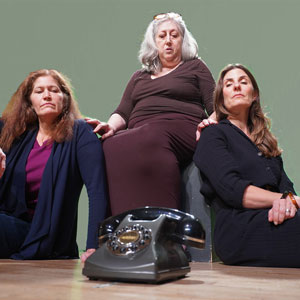
 Highly Recommended! **** Natural disasters can occur in all forms. Tsunamis, floods, hurricanes, earthquakes, tornados, and volcanos can wreck our physical environment and injure or kill our loved ones. All these catastrophes can rock our inner selves to the core. At the same time, there are other types of “natural disasters” rooted in family dynamics that can cause crises as horrible as material devastations. MadKap Productions’ “The Wind Phone”, directed by Wayne Mell and produced by Wendy Kaplan, is a story about the Mitchell family and the emotional struggles that they are going through. Based on Madelyn Sergel’s smart, tight, and beautifully-constructed script, we witness how the characters change before us as they come to grips with present events and revelations of past events, ranging from the earthshattering to the mundane.
Highly Recommended! **** Natural disasters can occur in all forms. Tsunamis, floods, hurricanes, earthquakes, tornados, and volcanos can wreck our physical environment and injure or kill our loved ones. All these catastrophes can rock our inner selves to the core. At the same time, there are other types of “natural disasters” rooted in family dynamics that can cause crises as horrible as material devastations. MadKap Productions’ “The Wind Phone”, directed by Wayne Mell and produced by Wendy Kaplan, is a story about the Mitchell family and the emotional struggles that they are going through. Based on Madelyn Sergel’s smart, tight, and beautifully-constructed script, we witness how the characters change before us as they come to grips with present events and revelations of past events, ranging from the earthshattering to the mundane.
In this intense drama, 54-year-old Ellen Mitchell Gray (Elizabeth Rude) is currently caring for her 85-year-old mother Patty (Maggie Speer), who is in declining health (as evinced by her unsteady walking and her growing forgetfulness). As the show begins, Ellen has spent a ridiculous number of hours packing boxes and clearing out the family house in anticipation of its eventual sale, now that her mother resides permanently in an assisted living facility called Evergreen. Enter her sister Jenny Mitchell (Susie Steinmeyer), who is six years older than Ellen. Jenny has just returned to Queens, New York, from her work in Japan, where she serves as a psychological counselor to survivors of the 2004 tsunami. Jenny has not seen her mother and sister during the last six years, and their mother (on leave from the facility for the weekend) is delighted to see her absent daughter once again. With the obligation for their mother’s care having fallen squarely on Ellen’s shoulders, Ellen is somewhat resentful of her sibling who has been away for so long and whom she feels is out-of-touch. Having the two sisters snipe at each other about their family situation, their mother’s healthcare, and life in general uncovers lots of feelings about their personal relationship that many in the audience can relate to.
Sergel’s dialogue is exceptionally well-crafted and poignant; the conflicts she creates are incredibly real; the raw emotion is palpable. What adds interest is how nicely the conversations are organized in dyads and triads. It’s not just the the uses of language that are impressive but the body language too. And the story is moving—which is meant in more than one sense of the word! The mother has already moved out of the house; the mother and daughters need to move on with their lives; and the show is both touching and sad and yet very watchable.
I was once told that in crafting a play, the first act is to set the characters in motion with their personalities, their background, their quirks, and their baggage. The second act then becomes the story you really want to tell. The first act of “The Wind Phone” is wonderful and enjoyable; the second act, sublime. The story is unexpected. The plot twist is great. The action moves quickly. The true confession puts us, as audience members, in the crosshairs. We are torn between being fascinated by the tales we are listening to and feeling that we are too intrusive in the family’s private business. The great part about this is that we experience the sensation of being placed in a similar situation for ourselves. What does it mean to live in a family mired in strife and dysfunction? What is the underlying reality that has made things what they are?
The idea of the wind phone (as in the title) is a Japanese one. In 2010, Itaru Saski, a garden designer from Ōtsuchi came up with the idea of placing a dead telephone in the middle of a garden so that people could “talk” to their deceased relatives on the phone. At first, the notion seems a bit silly if not childish, as if one could really talk to a person who is dead. But the point of the exercise is to reflect on the loss, explain yourself, forgive others, and evoke whatever sentiments that are important to you which you need to share with a loved one. When all these things are expressed to the “lost” person at the other end of the line, this becomes a psychic clearing or psychological cleansing that allows the living person to move on to the next chapter of their life. You’d have to see the show to understand exactly where the wind phone comes in. The concept is absorbing!
The performance runs two hours including an intermission, and it goes by very quickly.
The show has us asking many questions of ourselves: What is the balance between running your life versus caring for an elderly or disabled parent or relative? How much do you try to escape a bad family situation or adapt to it, either by choice or necessity? How much do you need to know about family secrets? Every family has them: some are more mind-blowing than others. So what exactly should remain hidden and what ought to be revealed—and to whom? How do we make this decision, and under what circumstances? And what secrets do we take to the grave with us?
“The Wind Phone” is playing through November 21, 2021, at the Skokie Theatre, 7924 Lincoln Avenue, in Downtown Skokie, near the southwest corner of Lincoln and Oakton.
 Tickets: $38
Tickets: $38
Seniors/Students: $34
Performance Schedule:
Friday and Saturday at 7:30 p.m.
Sunday at 2:00 p.m.
Wednesday matinee November 10 at 1:30 p.m.
For more information about “The Wind Phone” or to purchase tickets, go to https://skokietheatre.org/ or phone the box office at 847-677-7761.
Skokie Theatre requires all patrons to show proof of COVID-19 vaccination as they arrive at the theatre for their performance. Patrons who have not been vaccinated may provide proof of a negative COVID-19 test taken within 72 hours prior to the performance.
All Skokie Theatre staff, cast, musicians, ushers and crew are fully vaccinated.
Except for the performers, everyone is asked to remain masked while in the building, except while eating or drinking.
Note that “The Wind Phone” can be seen as part of a three-show subscription package which includes performances of John Patrick Shanley’s Tony Award-winning drama, “Doubt” (February), and the musical murder mystery “Something’s Afoot” (April). A subscription ticket costs only $95 and includes a fourth ticket that can be used to bring a guest to any one of the productions.
For reservations or general information about the theatre and other offerings, visit https://skokietheatre.org/ or call 847-677-7761
To see what others are saying, visit www.theatreinchicago.com, go to Review Round-Up and click at “The Wind Phone”.






More Stories
“Guys & Dolls”
“The Music Man”
“The S Paradox” reviewed by Julia W. Rath